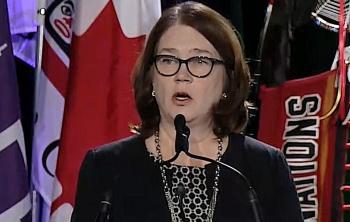Image Caption
Windspeaker.com Contributor
OTTAWA
Indigenous Services Minister Jane Philpott has reassured chiefs that she doesn’t want to return to litigation. But that’s where outstanding issues are going concerning the Canadian Human Rights Tribunal (CHRT) decision that said Canada underfunds on-reserve child and family services.
“We have to be able to figure this out between us. You have my assurances that litigation is not my preferred option on this,” Philpott told the chiefs at the Special Chiefs Assembly held in Ottawa last week.
Philpott was responding to a question from Atikameksheng Anishnawbek First Nation Chief Valerie Richer, who noted that on Nov. 30 — the same day the federal government announced First Nations child welfare legislation — Justice Canada sent a letter to the CHRT requesting dates to hear arguments on concerns still outstanding from the ruling.
“Minister, I’m asking for your intervention in terms of not going back to litigation,” said Richer.
In January 2016, when the CHRT ruling came down, the Trudeau government decided not to appeal. But since that time, the government has been served with five non-compliance orders.
On the agenda for the Dec. 17 case conference with the tribunal is setting dates for litigation on 23 outstanding issues, including the CHRT’s directive that the federal government compensate the children in care who were victims of discrimination.
The Canadian Human Rights Act allows up to $20,000 per victim and an additional $20,000 if that discrimination was “wilful and reckless.” Those eligible for compensation, according to the First Nations Child and Family Caring Society of Canada, are children who were in government care and children and families affected by Canada’s failure to implement Jordan’s Principle.
Compensation can be claimed dating back to 2006 (a year prior to the complaint being filed with the CHRT) and carry through to now as Canada has not fully complied with the CHRT’s orders. The federal government has not moved from is official position, in which it said it would pay no compensation.
“We have to right the wrongs of the past before we can strongly move forward together,” said Mary Teegee, proxy for the chief of Takla Lake First Nation. She added that compensation was one way for the federal government to make amends for doing wrong by First Nations children.
“This is not just about erosion of the human rights of First Nations children and those who have aged out, it is about the erosion of all Canadians if we can’t compensate for discrimination. If you have to take us back to court to get compensation for our most vulnerable, then your words, as you said, promises have to be backed by any action, those promises aren’t backed by any action,” said Teegee.
In addressing chiefs, Philpott quoted late Elder Elmer Courchene, who said, “Words do not feed a table.”
“Words need to be backed up by action and funding,” said Philpott, who committed her government to long-term funding of Jordan’s Principle, although did not offer any dollar figures.
The CHRT ordered funding to be the actual costs required to meet the needs of children. To date, the federal government has processed 171,000 requests under Jordan’s Principle.
Philpott was urged by David Pratt, second vice chief with the Federation of Sovereign Indian Nations, to implement the Spirit Bear Plan as a quick and efficient way of moving forward to help First Nations children.
The five-point Spirit Bear Plan calls on Canada to immediately implement the CHRT’s ruling and do away with discriminatory funding; to cost out all shortfalls in services to First Nations children, youth and families in every federal department and implement a plan to meet those needs; and to approach inequalities in a holistic manner and not piecemeal.
Chiefs passed two resolutions to move forward in meeting the needs of their children. The first resolution dealt with children and their families who suffered discrimination at the hands of the federal government, to be fully compensated according to the Canadian Human Rights Act. The second resolution stressed the need for a First Nations lens on the proposed child welfare legislation and supported implementation of the Spirit Bear Plan as part of that legislation.
Cindy Blackstock, executive director of the First Nations Child and Family Caring Society of Canada who, with the AFN, brought the complaint to the CHRT. She was in attendance for part of the chiefs’ assembly.
“I’ve been so honoured by the support, the advice, the guidance and the encouragement of grassroots citizens and the First Nations leadership throughout the entire duration of this case. Without them, this case would not be possible,” she said.
However, Blackstock isn’t as quick to praise Philpott or the minister’s promise not to pursue further litigation.
“That’s what we want to hear, but more important, we want to see them actually do something,” she said.
Blackstock points out that the case never should have gone to the tribunal in the first place.
“The fact that we would have to go back now and litigate again is beyond disappointing because it’s always the kids and the families at the end of the day who suffer from this,” she said.
Blackstock said the issues need to be resolved while the CHRT still has jurisdiction, which is set to expire March 31, 2019. However, an extension is possible.

